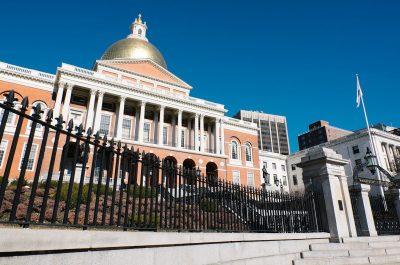Gov. Charlie Baker signed a bill with bipartisan support Friday committing Massachusetts to reaching net zero emissions by 2050.

The new law, titled “An Act Creating a Next-Generation Roadmap for Massachusetts Climate Policy,” adds a voluntary energy efficient building code for cities, creates short-term emissions goals and grants the Commonwealth the ability to secure an additional 2,400 megawatts of offshore, renewable energy by 2027, according to a Friday press release.
“I’m deeply proud that we managed to come together to create this bill,” Baker said at the signing ceremony. “I’m proud to say that climate change has not been, ever, a partisan issue. We know the impacts on our coasts, on our fisheries, on our farms and on our communities are real and demand action.”
Sen. Michael Barrett, D-Mass., introduced Bill S.9 to the Massachusetts legislature in January.
“We’re resetting the bar for ourselves, moving it higher, so we need everyone in state government pulling in the same direction,” Barret wrote in a statement released after the signing.
Katsyris Rivera-Kientz, a doctoral student at University of Massachusetts Boston, explained in an email how emissions are caused by humans.
“In a nutshell, emissions are gases that trap heat in the Earth’s atmosphere,” she wrote. “Emissions per se are not harmful while an excess of greenhouse gas emissions is a threat to Earth’s atmosphere and ecosystems.”
Rivera-Kientz added that human activity is the main driver of emissions.
Casey Bowers, assistant vice president for government relations at the Environmental League of Massachusetts, said producing net zero emissions differs from simply creating no emission.
“What that means is reducing our overall admissions of carbon, usually from either the built environment, from cars, from other transportation,” she said. “The state is planning to offset some emissions through sequestration, which would be basically the taking of emissions from the air through natural resources like forests and other carbon sinks.”
The ELM wrote in a statement that it was “proud” of lawmakers for signing into law a bill to improve the state’s environment and economy “for decades to come.”
Doug Pizzi, executive director of Massachusetts Conservation Voters, said Bill S.9 will help mitigate the “dire situation we find ourselves in regarding climate change and its impact on the Earth.”
The new law states that emissions must be at least 50% below the state’s 1990 measurements by 2030 and at least 75% lower by 2040.
Bowers said the usage of offshore wind power will be the “biggest driver” of eliminating emissions.
“We will be less reliant on fossil fuels, we will be more sustainable,” Bowers said, “and hopefully the rest of the states and ultimately the world will follow on this path.”
Pizzi said MCV, an organization that focuses mainly on the conservation of state parks, appreciates the new law’s focus on transparency in the environmental review process.
“If [people] are going to engage in projects near environmental justice populations, they have to do what’s called a Notice of Intent,” Pizzi said. “When you file a Notice of Intent, and when you do an [Environmental Impact Report] process, it becomes public knowledge that you’re trying to pursue a project.”
Pizzi said transparency is key to accountability.
“Oftentimes, if the public doesn’t know, then things can just fly by, and nobody knows about it,” Pizzi said. “Having a public process around these types of things is a good thing because then people are aware of what’s going on.”
He cited the attempt to turn 85 acres of Leominster State Forest woodlands into part of the Fitchburg/Westminster Landfill in 2018, which environmental groups were able to stop.
Bowers said Massachusetts residents may not immediately feel the new law’s impact, but changes may be visible gradually. She said electric cars and household upgrades to sustainable energy sources will be the most noticeable effects.
“Ultimately, there are going to need to be some changes at the personal level,” Bowers said. “But this is not going to happen overnight. This is going to be over the course of many years.”





















































































































